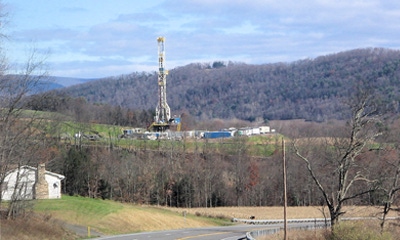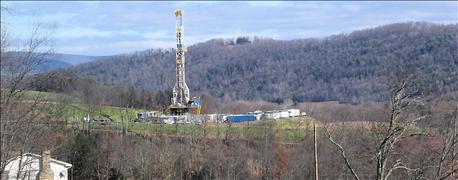September 22, 2016

Landowners with Marcellus natural gas leases are getting increasingly agitated over being shorted on lease royalties. After the Pennsylvania Department of Conservation and Natural Resources disclosed it had recovered $1.3 million in shorted royalties earlier this year, that anger intensified.
A week ago, close to 700 people attended a meeting in Bradford County, Pa., where they were urged to contact state legislative leaders about a bill aimed at ensuring gas companies pay fair royalties. The county is one of the most drilled parts of Pennsylvania. “It’s what I call ‘the great royalty rip-off,’” said Bradford Commissioner Daryl Miller.

DRILLED FOR MONEY: Pennsylvania audits found that the state had been shorted by energy producers on natural gas royalties.
Wilmot Township supervisors also considered a resolution demanding that production be discontinued from wells where landowners are having their royalty checks diminished to nothing or nearly nothing. The rural township is home to about 70 producing gas wells, according to state records.
A 1979 Pennsylvania law guarantees landowners a 12.5% royalty, regardless of expenses involved in extracting the gas. However, the gas companies and drillers contend landowners must abide by their signed contracts. If those contracts allow postproduction costs to be deducted before calculating a royalty, the rate may go lower than 12.5%, sometimes to zero and below — meaning the landowner owes money. Chesapeake Energy and Chief Oil and Gas are the county’s major gas lessors.
DCNR has leased 386,000 acres of publicly owned forestland for drilling. Like private landowners, it’s had problems getting paid properly. An agency accountant audited the books between April 2015 and July 2016 with a fine-tooth comb. Over the past year, DCNR collected $1.3 million in royalties it had been shorted.
“The audit definitely paid off,” said DCNR Secretary Cindy Dunn. “They usually haven’t paid us enough. If it were just a mistake, you’d think half [the companies] would have paid too much and half would have paid too little. But the ‘pay too little’ outranks the ‘pay too much’ by a lot.”
Lease terms are key
The state’s leases prohibit deducting postproduction costs related to transport and processing. The agency was able to recover more royalties since the leases require operators to pay 35 cents per thousand cubic feet of gas or a 20% royalty if it’s higher. Because gas prices have been so low, the 35-cent provision kicked in.
A 1979 state law requires oil and gas companies to give mineral owners at least a 12.5% royalty. Depending on lease language, drillers and landowners may share postproduction costs. These are expenses incurred when gas is transported to market through pipelines.
“A lease is a contract between a mineral owner and an energy producer,” says Marcellus Shale Gas Coalition spokeswoman Erica Clayton Wright. “Any disputes that may arise between these two parties over the terms of the contact have and will always be most effectively resolved by the courts.”
Courtesy of Marcellus Drilling News
You May Also Like




